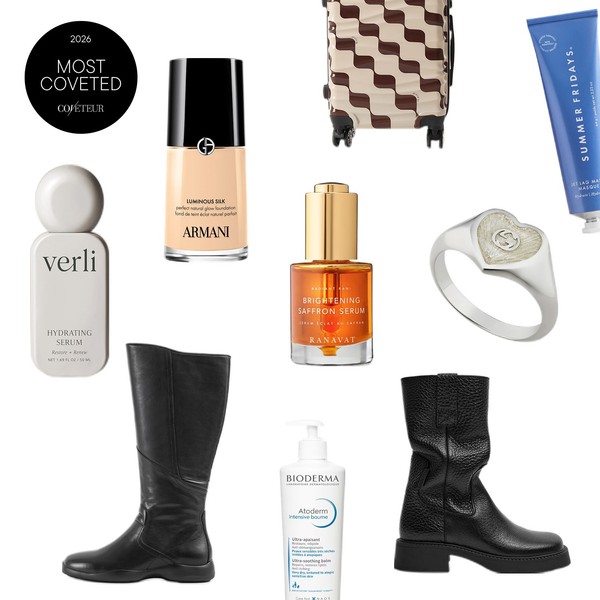This Is Who You Call When You Want to Go Under the Knife
Melinda Farina, aka The Beauty Broker, is the aesthetic industry’s official matchmaker.

Choosing a plastic surgeon or a dermatologist can be a daunting endeavor, especially when you're inundated with an onslaught of before-and-after posts from plastic surgeons every time you scroll through your feed. Picking your next plastic surgeon without doing the proper research can bring some serious consequences. That’s where Melinda Farina—The Beauty Broker—fits in.
When it comes to finding Dr. Right, Farina’s job is to educate patients on their aesthetic goals, recommend the best doctors for their specific procedure, and walk them through the entire process to ensure everything goes smoothly. Below, we chat with Farina about her career path, how she got into the business of aesthetic consulting, and how social media has impacted cosmetic surgeons.
On how she got her start:
“I started working in aesthetic dentistry when I was actually 13 years old. Then it trickled into plastic surgery because I was rooted in New York, so I started working with all of these top surgeons. At that time, I was young and curious, and I wanted to see these procedures up close and in person.
“The cosmetic dentist was a good friend of my parents, so when I turned 13, they were like, ‘Okay, time to go to work now.’ So right after school, my mom would pick me up, drive me over to the office, I’d work until 8 PM or 9 PM, come home, do my homework, then do it all over again the next day.
“I started working on the clerical side of things, so up at the front desk, before I worked my way to the back of the office, chair-side.
“Interestingly enough, when I was six, I said to my mom, ‘I want to be a dental hygienist,’ so I knew that was the space I wanted to go into. Then, it went from dental hygienist to cosmetic dentist, and I started schooling for it. And I hated it. It was so taxing on my back, clinic was awful, and I couldn’t handle the oral surgery rotations. It was too much for me, and I decided not to go down that path.
“I changed my major to organizational psychology, and I thought, ‘You know, I love working with these doctors, and I’m interested in the business consulting end of things.’ So that drove me to get a master’s degree in organizational psychology.
“When I wasn’t in school, I was still working as an office manager for plastic surgeons and dermatologists. They’d always bring up that there was a real need for patient advocacy and consulting. And at the time, there was only one woman doing it—she’s now retired.”
On launching her business:
“I started off in New York, and I had no intentions of expanding until several L.A.-based surgeons reached out to me. At the time, our business model was to have the doctors pay a membership fee for the year. We no longer do any types of payments from the doctors; I did away with that after about two years. I realized that if doctors were paying me, people would think it would compromise my recommendations. So, we switched it to a consulting fee for clients.
“The company just expanded, and every year it has grown bigger and bigger. Then, we had global outreach and patients from overseas who’d fly out to visit me in New York and wanted me to help them find surgeons in their area.”
On how she chooses the surgeons:
“I spend a lot of hours asking questions. All of my doctors have to pass ‘The Beauty Broker Litmus Test,’ and it’s a 250-question interview. It’s usually a two-year vetting process for each surgeon.
“I need to see consistency from them. And it’s only one procedure per surgeon. So, I want to know what their specialty is, what they're incredible at. Every surgeon has their niche, and you have to really identify what their niche is. You have to find cases that look similar to your own, then you look at the results. And you have to see about 50 of those, so you know there’s consistency across the board.”
On social media:
“Instagram has helped me grow my business, but in regards to the plastic surgeons on the app, I see people making huge mistakes in who they choose. Oftentimes, I feel like a lot of these Instagram famous doctors are photoshopping a lot of their work. They’re not being very honest or forthcoming, or they’re putting up old work instead of their new stuff.
“Also, when they start getting that busy or grow to become that popular or saturated, the quality of the work plummets. You cannot possibly do four facelifts a day; the quality of that facelift isn’t going to be what it was 10 years ago when you were doing one a day and spending more time giving your undivided attention to that case. Their egos go up, they only care about the money at that point, and they're completely burned out.
“I’m not a huge fan of these Instagram-famous doctors. I think fame is good for celebrities, but it shouldn’t apply to medical professionals or plastic surgeons. We should stop glorifying it. And listen, I love them, and most of them are dear friends of mine. But if they’re seeing too many patients in one day, I’m not afraid to tell them that I can’t send my clients to them in good conscience. I need them to wipe out their day and just focus on my one client. So, we do pause referrals to doctors if I see it going in that direction.
“We had a facial plastic surgeon in New York that I worked with for 13 years. A couple of years ago, he became very famous on Instagram, and the quality of work became very poor. And not only was the work subpar, but he would abandon his patients. He’d stop calling his patients back, and that’s absolutely not okay.
“After 13 years, one of my clients had seen him and the results weren’t great, so I tried to get in touch with him and he just cold turkey stopped speaking to me and would not take my calls. That was it—he was done, and I will never ever send another client to him.”
On the consulting process:
“I have several people helping me out on the backend, but I’m the only patient consultant, so there’s usually a five-month waiting period before they can get in to see me. Consultations usually range from 30 minutes to an hour, depending on how many areas the client wants to discuss. We look at their medical history, what procedures they’ve done, if it’s a revision case. That’s something that’s definitely important to take into consideration because not every surgeon is a good revision surgeon—some are better at only primary surgeries.
“It’s a conversation where we get to know one another, get a sense of what the patient’s goals are, and see if the goals are realistic. If they are realistic, then it’s about educating them on what can be done, what’s possible, and what the price is going to be. We take budget into consideration, so we ask everybody if they have a top price that they do not want to go over. We try to really match the patient to the right surgeon—it’s kind of like a matchmaking service of sorts. Then, we usually give about four or five names and send them to do some consultations and get some treatment plans.
“After they're finished seeing surgeons, they come back and we meet with them. We review everything: What did you think? How did you feel? Did you like the surgeon? Did you like his work? Were you comfortable? And then to have a conversation with the surgeon, we get the patient booked. I see the entire process all the way through—we follow up with our patients post-surgery to see how they're feeling.”
On what’s next for her business:
“We see exponential growth every single year, so the next move is to hire more me’s. As I get older, I am just at that place in my life where I'm like, ‘Okay, we need to hire more Melindas.’ I need to take a step back and oversee the whole operation. I love what I do. But I don't want to turn into that professional who burns out. I’ve seen that happen to so many people, so I know when it's time to take a step back.”




